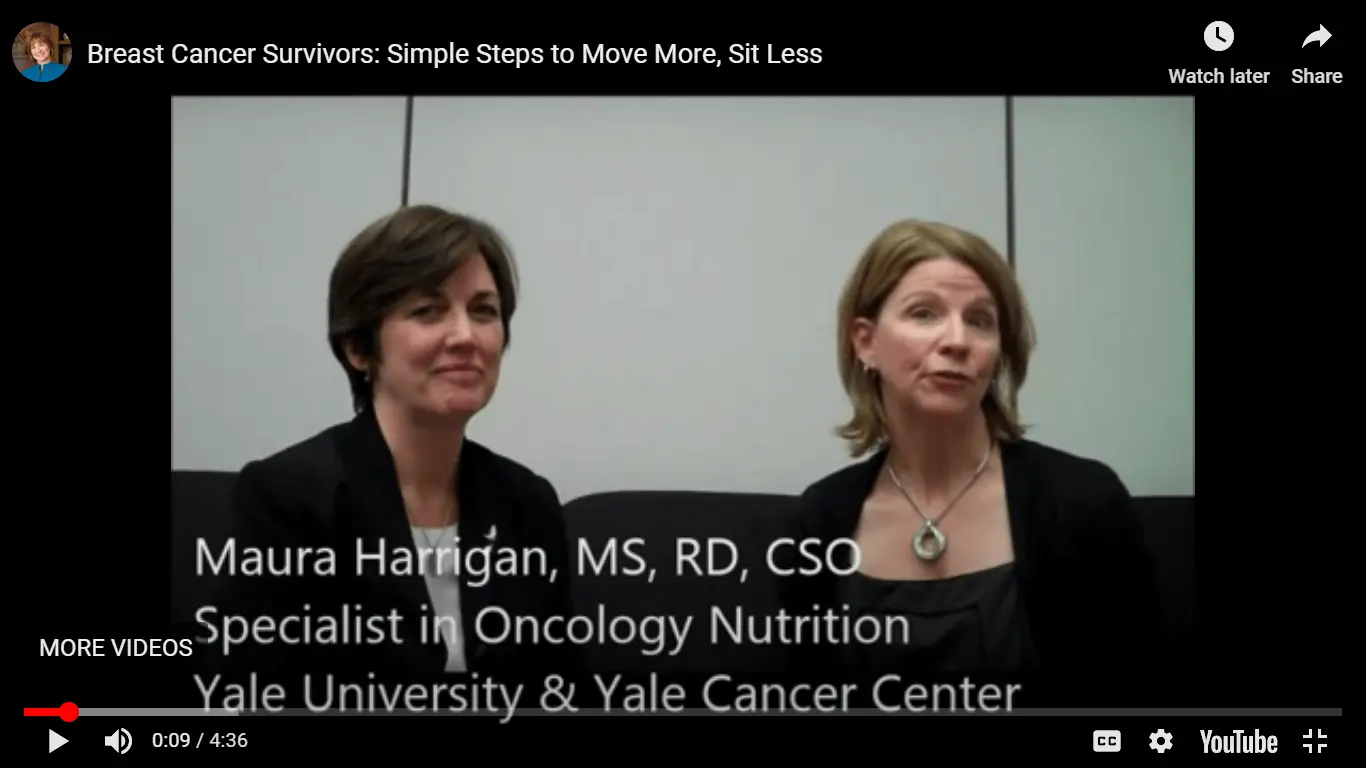
Cancer Survivors: Is Exercise Worth It?
Exercise? Aren’t cancer survivors supposed to rest a lot, especially when experiencing the classic problem of cancer-related fatigue?
I still remember when my grandmother had a heart attack and was put on extended bedrest. Not so today – getting people up and moving after heart attack or cardiac procedure is standard care now. What’s not so well known yet are research findings on how physical activity may provide benefits of many sorts for cancer survivors.
Here, in the third section of a video interview with Maura Harrigan, MS, RD, CSO, you’ll hear about what she’s found through participation in research trials and working with individual cancer survivors. Whether or not you are (or know) a cancer survivor, her information is spot-on and her message so positive and empowering, you won’t want to miss this.
Maura Harrigan is a registered dietitian who is a board-certified Specialist in Oncology Nutrition. Ms. Harrigan is a research associate at the Yale School of Public Health, and Nutrition Director of the Cancer Survivorship Clinic at Yale Cancer Center. She is part of a key study there known as the Lifestyle, Exercise and Nutrition (LEAN) Study, which may have major implications for breast cancer survivors’ care in the future.
Following the video, read on for more that that may help put this information in context of choices that promote cancer survivors’ health.
Physical Activity and Cancer Outcome
The largest number of studies pertaining to exercise and cancer survivors are those with survivors of breast cancer, although studies have been conducted in survivors of other cancers, too.
Observational studies ask people about activity and follow their health outcomes over time. These studies have ways of statistically adjusting for other factors that can impact health outcome – such as stage of cancer and age. However, we need to remember that in these studies, if people who are more active have better health outcomes, we can’t be completely sure whether it was being more active that helped them do better, or whether better health allowed them to be more active.
- Among breast cancer survivors, physical activity equivalent to the basic recommendations for overall health for all adults – about 30 minutes of moderate activity five days a week (150 minutes/week) – was linked with 24% fewer deaths from all causes when results of 16 studies were analyzed together. This included fewer deaths from breast cancer and from other causes. Though many don’t realize it, among breast cancer survivors, heart disease is a major cause of death.
- Among survivors of colorectal cancer, physical activity equivalent to the 150 minutes/week of moderate activity was linked with 28% fewer deaths from all causes, based on combined analysis of seven studies.
- Smaller amounts of physical activity is linked with smaller, but still important, effects. Breast or colorectal cancer survivors who increased their physical activity by any level from pre- to post-diagnosis showed better outcome compared to those who did not change their physical activity level.
- Whether or not breast and colorectal cancer survivors were overweight did not change the improvement in outcomes linked with physical activity.
- Among prostate cancer survivors, in a study of over 2700 men, those who were more physically active after diagnosis had fewer deaths overall, and from prostate cancer specifically, than those who were least active, after researchers adjusted statistically for factors like cancer stage and treatment, weight, and other medical problems.
Intervention trials allow researchers to create more equal comparison groups to look at how exercise affects survivors’ health and well-being. Because of the challenges of conducting such studies, they usually include fewer people followed for shorter periods than in the large observational studies. Since these studies are shorter, they often look at physical activity’s influence on markers of health, rather than final outcomes like cancer recurrence itself.
- Trials promoting physical activity consistently demonstrate improved fitness and strength, decreased fatigue and sleep disturbances, and improved quality of life among cancer survivors in general.
- Based on an analysis of intervention trials of people with early stage cancers of the breast, prostate or colon, or non-Hodgkin’s lymphoma, those not assigned to exercise seem to decline in fitness, while those in supervised exercise programs during, and especially following treatment, improve.
- Intervention trials of breast cancer survivors have demonstrated increased lean body mass, decreased body fat, reduced levels of insulin and IGF-1 (a growth factor linked to growth of cancer cells). Since elevated insulin levels are linked to cell proliferation and cancer risk as well as metabolic syndrome and cardiovascular risk, this may be a significant benefit of physical activity. Some evidence suggests that the people most likely to reduce insulin levels by increasing activity are the ones most likely to have elevated levels – those who are obese or sedentary.
- Prostate cancer survivors treated with androgen deprivation and radiation therapies – which can lead to rapid changes in body composition — who participated in a six-month supervised exercise program followed by a six-month home based maintenance program showed improvements in fitness and strength.
Individualization & Support are Key
A panel of researchers convened by the American College of Sports Medicine concluded that although much is still unknown about how physical activity affects outcomes like cancer recurrence, evidence is so strong supporting benefits to physical functioning, quality of life and cancer-related fatigue, even during treatment cancer survivors should be advised, “Avoid inactivity”.
Exercise goals and plans need to be tailored to the health, treatment effects and needs of each individual cancer survivor. Survivors dealing with indwelling catheters, neuropathy, balance problems, bone metastases, joint pain or lymphedema should especially ask for help to figure out how to work around such issues. Since there are specific considerations in planning physical activity appropriate for individual cancer survivors, at least starting with a Certified Cancer Exercise Trainer is often a smart move.
What if You’re Not Overweight? What if You’re Overweight, but Exercise Does Not Lead to Weight Loss?
In many people’s eyes, exercise has become so tied to “dieting” and efforts to lose weight, its role in promoting health for people of all sizes can get lost. Cancer survivors often lose fitness during their cancer journey, which takes a toll on health and ability to enjoy life, and appropriate physical activity can help to restore that fitness. Moreover, as noted above, physical activity can help improve sleep and reduce cancer-related fatigue, so it is a mistake to think of exercise only as a way to lose weight.
For those who are overweight, you heard in earlier sections of my video interview with Maura Harrigan that excess weight appears linked to worse outcomes among cancer survivors. In these cases, moderate weight loss may support best long-term health, especially among those who are most overweight, and if achieved with healthful eating and exercise, and efforts to minimize loss of lean muscle tissue. Regular physical activity can support weight loss, and is an even better tool to minimize loss of muscle during weight loss and to help people maintain weight loss they achieve.
Some people may increase their physical activity in hopes of losing weight, and become discouraged when weight does not drop as quickly as they expected. How is it possible that you could become more active and not lose weight? That is a question we’ll address in an upcoming research update. Click here to sign up and receive articles by email, and you won’t miss that and all the other exciting topics coming up!
Meanwhile, cancer survivor or not, let’s remove physical activity from its association with weight and focus on the many ways that it provides something you can do every day and receive multiple health benefits. Surely, that’s worth one less television show, or a few less emails or YouTube videos.
Resources
To find someone certified by the American College of Sports Medicine (ACSM) and American Cancer Society (ACS) as qualified to work around unique concerns some cancer survivors may have, visit the ACSM ProFinder website to find an ACSM/ACS Certified Cancer Exercise Trainer near you.
The American Institute for Cancer Research (AICR) offers a three-part series that offers people – cancer survivor or not — help to gradually create a lifestyle that incorporates regular physical activity. Different brochures target individual stages: Start Where You Are, Keep It Up, and Mix It Up (targeting long-term lifestyle).
References
Schmid D, Leitzmann MF. Association between physical activity and mortality among breast cancer and colorectal cancer survivors: a systematic review and meta-analysis. Ann Oncol. 2014 Mar 18. [Epub ahead of print]
Ballard-Barbash R, et al. Physical Activity, Biomarkers, and Disease Outcomes in Cancer Survivors: A Systematic Review. J Natl Cancer Inst. 2012 Jun 6;104(11):815-40.
Pekmezi DW, Demark-Wahnefried W. Updated evidence in support of diet and exercise interventions in cancer survivors. Acta Oncol. 2011 Feb;50(2):167-78.
Speck RM et al. An update of controlled physical activity trials in cancer survivors: a systematic review and meta-analysis. Journal of Cancer Survivorship, 2010. 4(2):87-100.
Jones LW, Liang Y, Pituskin EN et al. Effect of exercise training on peak oxygen consumption in patients with cancer: a meta-analysis. Oncologist. 2011. 16(1):112-20.
Irwin ML, Alvarez-Reeves M, Cadmus L et al. Exercise improves body fat, lean mass, and bone mass in breast cancer survivors. Obesity (Silver Spring). 2009 Aug;17(8):1534-41.
Ligibel JA, Campbell N, Partridge A, et al. Impact of a mixed strength and endurance exercise intervention on insulin levels in breast cancer survivors. J Clin Oncol. 2008 Feb 20;26(6):907-12.
Irwin ML, Varma K, Alvarez-Reeves M, et al. Randomized controlled trial of aerobic exercise on insulin and insulin-like growth factors in breast cancer survivors: the Yale Exercise and Survivorship study. Cancer Epidemiol Biomarkers Prev. 2009 Jan;18(1):306-13.
Galvão DA, Spry N, Denham J, et al. A multicentre year-long randomised controlled trial of exercise training targeting physical functioning in men with prostate cancer previously treated with androgen suppression and radiation from TROG 03.04 RADAR. Eur Urol. 2014 May;65(5):856-64.
Schmitz KH, Courneya KS, Matthews C, Demark-Wahnefried W, Galvão DA, Pinto BM, Irwin ML, Wolin KY, Segal RJ, Lucia A, Schneider CM, von Gruenigen VE, Schwartz AL; American College of Sports Medicine. American College of Sports Medicine Roundtable on Exercise Guidelines for Cancer Survivors. Medicine & Science in Sports & Exercise, July 2010. 42( 7):1409-1426.
Inoue-Choi M, Robien K, Lazovich D. Adherence to the WCRF/AICR guidelines for cancer prevention is associated with lower mortality among older female cancer survivors. Cancer Epidemiol Biomarkers Prev. 2013 May;22(5):792-802
1 Comments
Leave a Comment
Published : May 22, 2014
Tagged: breast cancer survivor, cancer survivors, exercise, healthy lifestyle, Maura Harrigan, pedometers, physical activity, researcher interviews, sedentary lifestyle, video interview, walking
Meet the author/educator
I Take Nutrition Science From Daunting to Doable.™
As a registered dietitian nutritionist, one of the most frequent complaints I hear from people — including health professionals — is that they are overwhelmed by the volume of sometimes-conflicting nutrition information.
I believe that when you turn nutrition from daunting to doable, you can transform people's lives.
Accurately translating nutrition science takes training, time and practice. Dietitians have the essential training and knowledge, but there’s only so much time in a day. I delight in helping them conquer “nutrition overwhelm” so they can feel capable and confident as they help others thrive.
I'm a speaker, writer, and nutrition consultant ... and I welcome you to share or comment on posts as part of this community!



[…] Cancer Survivors: Is Exercise Worth It? […]